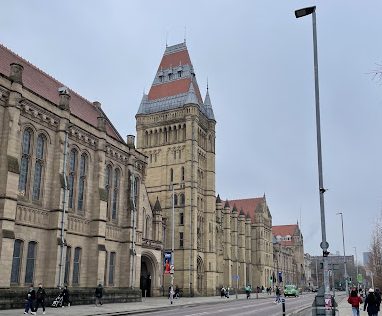Should You Study Abroad?

Peyton Barish pursuing his education in Manchester through NC State’s Study Abroad Program
April 6, 2022
When it comes time for every high schooler to graduate, they must evaluate their options. Those options aren’t just the initial benefits that come with enrolling at any given school but also what that school may do for them along the way. One of the benefits that can come with a school in the longer term is the chance to study abroad as an upperclassman. Studying abroad gives students the opportunity to both explore and immerse themselves in a new culture and country. In addition, such arrangements allow them to make connections across the globe relating to their major.
Specifically, North Carolina universities are very privileged in this case, as the top public institutions in the state have destinations for study abroad programs that most other universities around the country don’t have. Take for example the Copenhagen Business School in Denmark, which partners with a greater number of North Carolina institutions than any other state. However, that one program is a minuscule representation of the sheer number of destinations now available to college students. Each of the top universities in the state offers hundreds of possible programs that undergraduate or graduate students can participate in.
Even though North Carolina offers an impressive amount of study abroad options, this does not mean that going out of state will in any way prevent the chance of studying abroad from existing. The trend of studying abroad seems to be on the upturn according to the Institute of International Education. The IIE is a non-profit organization centered around promoting international opportunities for higher education. IIE studies show that around 5.5% of students in higher education study abroad.
Despite the effects of COVID slowing this upward trend, the choice to study abroad appears to have bounced back into popularity. This growth in interest will most likely lead to colleges placing greater emphasis on study abroad programs and has the potential to cause a growth in the options that these colleges present to their student body.
What is especially interesting about this 5.5% is the actual splits of location choice. As NAFSA reports that more than half of the destinations where people choose to study abroad are in Europe. Following distantly are the percentage of study abroad students that go to Latin America or Asia. This disparity is something to consider when planning on where to actually go when studying abroad. The majority of opportunities will most likely be found in Europe, with diminished options outside of that area for most colleges.
What must be discussed, though, is the actual experience that study abroad students have, and if they are positively or negatively affected. To get some feedback and insight into study abroad examples, teachers of Green Hope who chose to study abroad in college were asked to describe their experiences:
One teacher from the English department, Ms. Erin Peters, recalled her time abroad in Cambria, England as an amazing experience that was very flexible. According to her, the program had a major advantage in that it gave her and her peers the ability to “take field trips as a group all over England throughout the semester.” Due to the location of her studies, she said she had no trouble adjusting “like someone who would have to get used to a new language.” She instead focused on the exploration aspect, and her main goal “was focused on traveling as much as possible and trying to see everything.” However, she admitted that some of the cultural norms in England did take a bit of getting used to, such as the prevalence of public transportation as the main means of traveling. She also mentioned that her host parent didn’t seem to like her or another girl from her program. Though, she followed up by saying that it didn’t affect her much because “we were often traveling anyway.” All in all, she believes that “traveling abroad is absolutely worth the cost.” and that “if you have the opportunity, go!” If she were to go back and choose a different destination, she would prefer “to go somewhere that speaks Spanish.”
Another teacher from the English department, Mrs. Carolina Moakley, also weighed in on the subject with her own experience studying abroad. As for where she studied, Cape Town, South Africa was her destination of choice for a myriad of reasons. One of those reasons was that she “had taken multiple classes at UNC about South African history and the Truth and Reconciliation Commission” and that going to Cape Town would only enhance that learning. A big part of her excitement was the change of pace from being in Cape Town compared to being in the regular classroom. Something memorable and integral to her time there was riding her bike around and traveling throughout the country.
A drawback she felt was the fact that buildings in South Africa often don’t have heat, and that “South Africa has a very rich culture, but it does not have Mexican food.” South Africa left an important impact on her because of how different life was there in comparison to the United States. In her words, “It was very interesting to experience life as a racial minority, especially given South Africa’s complicated history.” In addition, she believes “it was eye-opening to see the way this openness plays out on the daily level between individual citizens and at a national level with their politics and culture.” Overall, Mrs. Moakley thoroughly enjoyed the experience and would like to go back, and recommends people to “certainly take advantage of all opportunities for new experiences.”
Obviously, these two responses give glowing approval to the study abroad program should the means be available for students to participate. However, of course, that doesn’t mean it is a perfect fit for everyone. If you are a high school student considering any given location, make sure to be introspective and determine if traveling, integrating, and familiarizing yourself with new surroundings works for you. If not, proceed with caution. Though if that sounds just like you, go on ahead and start up your itineraries.








































































remit2any • May 2, 2025 at 9:20 am
While the article acknowledges that studying abroad might not be for everyone, it strongly suggests that those who have the opportunity should seriously consider it. From my perspective, the potential rewards – both personally and professionally – seem to outweigh the challenges. The chance to learn in a new academic environment, navigate a different culture, and develop independence is an experience that can shape an individual in profound ways.